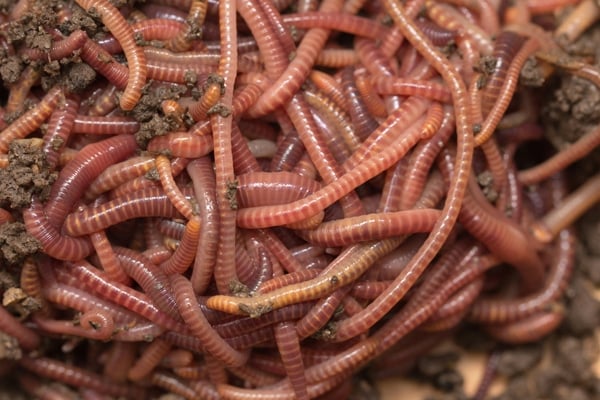Experience the Benefits of Using Red Wiggler Express for Superior Lawn Care
Experience the Benefits of Using Red Wiggler Express for Superior Lawn Care
Blog Article
Red Wigglers: The Unsung Heroes of Organic Waste Recycling
Red wigglers, or Eisenia fetida, serve as crucial representatives in the natural waste recycling procedure, changing discarded products into beneficial vermicompost. As the world increasingly looks for services to deal with waste buildup and enhance agricultural productivity, comprehending the duty of these worms comes to be important.
What Are Red Wigglers?
The exceptional resilience of red wigglers, scientifically referred to as Eisenia fetida, underscores their important role in organic waste recycling. These small, reddish-brown earthworms are typically located in breaking down natural matter, such as compost heap and manure heaps. Lake Hickory Bait. Unlike various other earthworm species, red wigglers flourish in nutrient-rich settings and are very effective at damaging down natural products, making them crucial for vermicomposting

(Red Wiggler Express)In addition to their duty in waste reduction, red wigglers add to dirt health by enhancing dirt structure and oygenation through their delving tasks (Lake Hickory Bait). Their visibility in composting systems not just enhances disintegration prices but also advertises a lasting approach to lose monitoring, showing their significance in eco-friendly preservation initiatives
Advantages of Composting With Worms
Composting with worms, particularly red wigglers, uses countless benefits that enhance both waste administration and dirt health. These worms successfully damage down organic waste, converting it into nutrient-rich vermicompost that enriches soil. This process speeds up decay, enabling a much faster recycling of cooking area scraps and other organic materials compared to standard composting techniques.
Furthermore, the vermicompost produced by red wigglers is brimming with valuable microbes, which aid enhance dirt framework, aeration, and moisture retention. This enhances the total health and wellness of plants, advertising energetic development and increased returns in yards and farming settings. The use of worms in composting lessens the manufacturing of greenhouse gases, such as methane, adding to a much more lasting waste administration system.

How to Beginning Vermicomposting
Establishing a vermicomposting system is a simple process that can produce considerable advantages for both waste management and dirt enrichment. To begin, pick an appropriate container, such as a plastic container or wooden box, with appropriate air flow holes to make certain proper air flow. The dimensions need to preferably be about 2 feet by 3 feet, enabling click reference ample space for the worms to prosper.
Next, prepare bedding product, which can be composed of shredded newspaper, cardboard, or coconut coir. This bed linen ought to be dampened to produce a suitable habitat for the worms. Once the bed linens is in location, present red wigglers (Eisenia fetida) right into the bin, generally around one extra pound of worms for every square foot of area.
Following the positioning of worms, add organic waste, such as fruit and veggie scraps, coffee premises, and crushed eggshells. With these actions, you will properly launch a vermicomposting system that adds to sustainable waste management and improves your dirt.
Preserving a Healthy Worm Container
(Red Wiggler Express)Keeping a worm bin thriving calls for regular interest and like ensure the health and wellness of the red wigglers and the effectiveness of the composting procedure. Appropriate upkeep starts with keeping track of the moisture degrees; the container needs to perspire however not soaked. An excellent general rule is to keep an uniformity comparable to a wrung-out sponge.
Aeration is vital as well. Delicately blending the bed linen and food scraps every couple of weeks protects against compaction and guarantees that all worms have access to oxygen. Furthermore, it is essential to feed the worms appropriately. A balanced diet plan of vegetables and fruit scraps, coffee grounds, and smashed eggshells should be used in small amounts to prevent overfeeding, which can lead to odors and bugs.
If the container ends up being as well warm or chilly, the worms might become stressed out. By diligently handling these elements, one can maintain a robust and productive worm bin.
Impact on Lasting Living
The effective maintenance of a worm bin not just profits the health and wellness of red wigglers yet additionally adds dramatically to lasting living practices. By recycling organic waste, such as cooking area scraps and backyard debris, red wigglers help divert considerable amounts of product from garbage dumps. This reduction in waste not only decreases greenhouse gas exhausts yet likewise minimizes the ecological worry related to waste administration.
Furthermore, the castings generated by red wigglers serve as a nutrient-rich natural plant food, improving soil health and wellness and promoting plant development. This natural choice to chemical fertilizers supports lasting agriculture and gardening methods, lowering reliance on synthetic inputs that can damage ecological communities. In addition, worm composting fosters awareness of waste administration, motivating people and areas to embrace even more lasting practices.

Conclusion
In recap, red wigglers serve as essential factors to organic waste recycling through their reliable disintegration of organic materials. By integrating vermicomposting into waste management strategies, people and neighborhoods can significantly reduce waste while advertising ecological sustainability.
Report this page